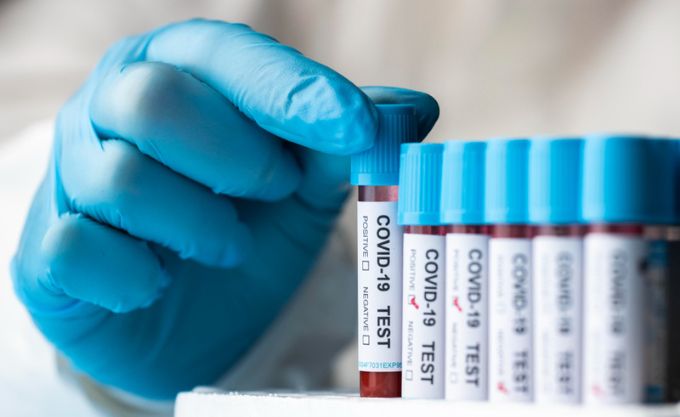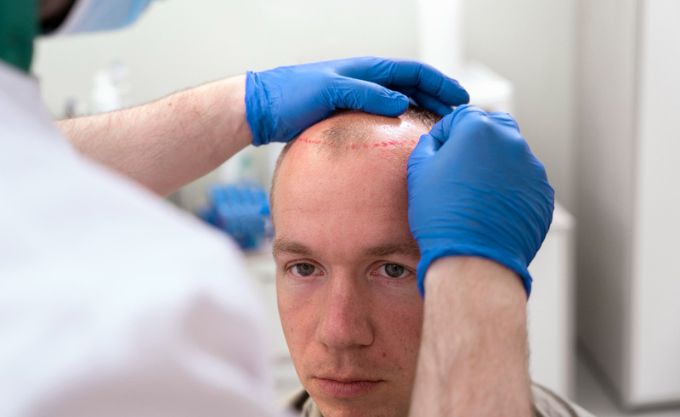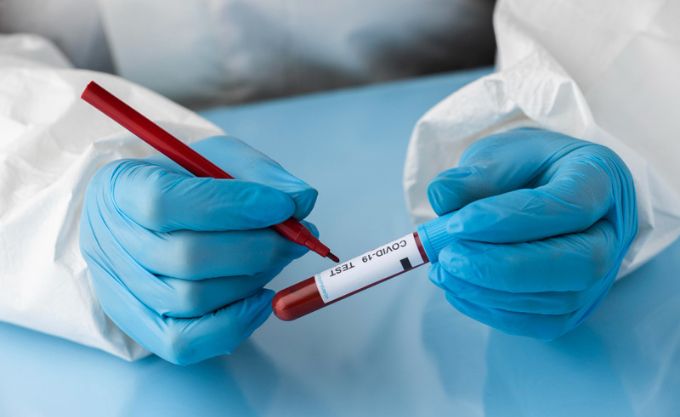Blood Tests for Hair Loss Recovery: All Lab Tests Covered
- Written by Vivek Khullar
- Oct 23, 2024
- |
- 16 min read
 Listen to the full text
Listen to the full textWe all lose around 50 to 100 hair strands each day but what to do when that number starts creeping up and you don’t know why? If you’re noticing more hair on the sink or shower drain than usual, it’s time to dig deeper. Blood tests are definitely a great way to get started.
According to dermatologists, both men and women need to undergo specific blood tests to uncover the root of the hair loss, and kickstart their recovery. But hey, which tests should you ask for? Don’t worry, we are here to help you out.
In this blog, Lordhair will share a comprehensive list of blood tests for hair fall recovery. By the end of this read, you’ll feel confident about your next steps.
Are you in a rush? Here’s a TL;DR version of the article:
What blood tests should I undergo for hair loss recovery?
Blood tests like vitamin D, B12, thyroid function, and iron levels help identify the cause of hair fall in men and women. They guide doctors in suggesting personalized treatments to restore hair health.
How can I conceal hair loss while awaiting treatment results?
Hair systems offer a quick, non-surgical solution to conceal hair loss. Lordhair offers high-quality hair units that look natural and provide full coverage while waiting for your treatment to show results.
Do blood tests detect all types of hair loss conditions?
No, blood tests or lab profiles can’t detect all types of hair loss conditions. Further investigation might be required by the dermatologist or trichologist to ascertain the root cause.
How much do blood tests cost?
Cost of lab tests varies from region to region. Hence, it would be hard to ascertain the exact cost for the recommended blood tests. Please visit your nearest lab to confirm the cost.
Now that we are done with the quick version, let’s go through the recommended blood tests for hair loss and thinning in detail.
What Blood Tests Should I Undergo for Hair Loss Recovery?
If you’ve been shedding more strands than usual, the following blood tests will be the best guide for males and females to uncover underlying issues:
Vitamin D test
Also called sunshine vitamin, vitamin D is not just important for strong bones but also for healthy hair. Its low levels have been linked to hair loss as it plays a role in creating new follicles. If your body doesn’t have enough of it, your hair may not grow as thick or as fast as it should.
Get a simple blood test to check your vitamin D levels. If you’re deficient, your doctor may recommend dietary changes, supplements, or more time in the sun to get your hair growing again.
Vitamin B12 test
Another key player in your hair health. Men and women who are low on B12 might notice that their strands have become brittle, thin, and more prone to falling out. This is especially common in people who follow vegetarian or vegan diets as B12 is commonly found in animal products.
Older adults and people with certain digestive issues are also at risk. A B12 deficiency doesn’t just affect your hair; you may also feel tired and run down quite frequently. Go for vitamin B12 deficiency tests to check your levels, and determine if you need to up your intake through food or supplements.
Thyroid test
Thyroid (yes, that small butterfly-shaped gland in your neck) might not seem hair critical in the first instance but it’s actually one of the most common culprits behind hair loss. Both overactive and underactive thyroid can throw your complete hair growth cycle out of whack, resulting in extreme shedding or hair thinning.
We suggest having thyroid function tests at the lab nearby. You will be able to measure your levels of hormones like T3, T4, and TSH, determining if your thyroid is behaving properly. If it is not, get the right treatment to restore balance to both your hormones and hair growth.
Iron studies with ferritin test
Iron is like a fuel for your hair follicles. Have it at adequate levels in your body and your hair follicles stay strong and healthy. Low iron levels can cause your hair to become weak and start to fall out. This is especially common in women, particularly those who experience heavy periods.
Ferritin blood tests will help you measure how much iron is stored in your body. If you’re running low on iron, your dermatologist may recommend eating iron-rich foods like red meat, seafood, beans, peas, tofu, dark green leafy vegetables, and dried fruits to help rebuild your iron stores and overcome hair loss.
Sex hormone tests
Blood tests that measure hormones like testosterone, DHEA, and some female hormones can reveal whether they are out of balance or doing fine. If you’re experiencing hormonal hair loss, treatments like hormone therapy, lifestyle changes, or medications can help you restore your hair’s health.
6 Complete blood count (CBC) test
Another important blood test that can help males and females in hair loss recovery. CBC test is a general health check-up that measures the levels of various blood components including:
- Red blood cells (RBCs)
- White blood cells (WBCs)
- Platelets
The CBC test provides valuable information that can help medical experts diagnose conditions like anaemia and other underlying health issues that might be affecting your strands. Men and women must undergo this type of blood test if they want a broad overview of their overall health!

Blood sugar levels (HbA1c test)
Next up on our list is the HbA1c blood test. Sugar imbalances in the blood don’t just affect your energy levels but also hair cells. People with uncontrolled diabetes or insulin resistance might experience hair thinning or loss due to the effects of high blood sugar on the body’s ability to nourish follicles.
HbA1c test will measure your average blood sugar levels over the past few months, helping your dermatologist determine if blood sugar issues could be contributing to your hair fall. In case your blood sugar is high or low, take immediate management actions to bring it normal. That way, you may improve your overall hair condition.
ESR and C-reactive protein levels
As we said before, hair loss in some males and females could be a sign of an underlying inflammatory condition like lupus. To them, we suggest having ESR (erythrocyte sedimentation rate) and C-reactive protein (CRP) blood tests. These will help you measure inflammation in the body.
If your levels are elevated, it could indicate that your immune system is overactive and attacking your hair follicles. Identifying inflammation early on will let you take action before it causes long-term damage.
How to Conceal My Hair Loss While Awaiting Diagnosis After Blood Test?
The truth is treatments that you may opt for after getting blood test results might take time to show their effect. But hey, you don’t have to feel self-conscious about hair loss. Luckily, there’s a quick and effective way to get a head full of hair. That too without surgery or pain.
*Enter hair systems*
Also called men’s hairpieces and wigs for women, these are non-invasive solutions designed to look and feel just like your natural strands. Made from high-quality materials, men and women can wear them confidently for any occasion, knowing they are nearly undetectable.
Lordhair offers some of the best non-surgical replacements available, known for their comfort, durability, and longevity. Whether you need a hair recovery unit for everyday use or a special event, we provide customziation options that fit your lifestyle and personal style.
Plus, our hair systems are easy to maintain and affordable, making them accessible to everyone. From the moment you wear a Lordhair system, you’ll experience the confidence that comes with having a full head of hair.
No waiting, no surgeries, and no hassle! Check out this video to see how hair systems work.
We are done with major lab tests for hair loss but some of you might want to know about hair loss and how it happens. For such readers, we took time to expand some more on the condition that affects billions of men globally.
Let’s start understanding the meaning.
What is Hair Loss?
Hair loss is more than just occasional strands that you see on your pillow or catch in your brush. It’s a process that can gradually change the way you look and feel. Sometimes in subtle ways and sometimes more dramatically. Think of your hair as a garden that needs extra care. When it doesn’t get what it needs, the once lush landscape may start to thin out.
Whether it’s a slow shedding that leaves your scalp a little more visible each month or a sudden drop in hair density, hair loss is super frustrating for most of us. After all, our strands are not just about vanity. They are often tied to our confidence and identity.

What are Potential Causes of Hair Loss?
Hair loss is no less than a silent thief, slowly taking away what many of us hold dear - our strands. But like any mystery, there’s a culprit lurking behind the scenes. Hair loss usually doesn’t happen for just one reason. It’s often a mix of several factors that can vary from person to person.
Understanding the potential causes is key to solving the puzzle and finding a path to recovery. Here are the most common reasons for hair fall in men and women:
Genetics
Does hair loss run in your family? Do your father, uncles, and grandfather have a bald head? Chances are your genes may be playing a big role. Androgenetic alopecia (also called male-pattern baldness or female-pattern hair loss) could be the leading cause in your case. It’s a hereditary condition where sensitivity to a hormone called dihydrotestosterone (DHT) causes follicles to shrink over time.
For some, this may begin as early as their 20s. Other genetic conditions like alopecia areata (which causes patchy hair loss) and cicatricial alopecia (which results in scarring and permanent hair loss) can also be players in your hair’s disappearance act.
Hormonal changes
Hormones have a sneaky way of controlling more than we realize. For them, hair is no exception! Significant life events such as pregnancy, post-pregnancy, menopause and even conditions such as thyroid disorders and PCOS can throw your hormones off balance, leading to hair loss amongst other things.
These shifts can cause temporary thinning or shedding that often reverses itself once the hormonal imbalance is corrected. For instance, many women experience thicker hair during pregnancy but face sudden shedding a few months after giving birth. Although we said hormonal changes are often temporary, experiencing hair loss due to them can still be distressing.
Medical conditions
Certain medical conditions can also wreak havoc on your hair. Autoimmune diseases like lupus can make your body attack its own hair follicles. Leading to patchy hair fall or even more widespread thinning. Scalp infections like ringworm and fungal infections can also damage your root sheaths, causing temporary hair loss if left untreated.
Additionally, medical treatments like chemotherapy and radiation therapy are infamous for causing temporary hair fall. Surprised? Well, it’s true! These treatments attack rapidly dividing cells (including hair sacs), leading to significant hair shedding. The good news is that in most cases, hair will grow back once the treatment ends!
Check out these sources as well:
Yes, oily scalp and hair loss have a connection
Here’s latest report on sugar for hair loss regrowth
Nutritional deficiencies
Dermatologists state that our hair needs the right nutrients to thrive. And when it’s deprived of these essentials, it can start to weaken and fall out. Iron, vitamin D, and biotin are all crucial for healthy hair growth. Deficiencies in these nutrients can lead to hair loss.
Iron deficiency, in particular, is a common cause of hair thinning as it reduces the oxygen supply to hair follicles. Similarly, low levels of vitamin D have been linked to hair loss as this vitamin helps create new hair growth cells. But hey, there’s more to the nutritional deficiencies story. Check out this blog for essential vitamins and nutrients for hair growth.
Stress and lifestyle factors
Sometimes, the biggest cause of hair fall and thinning can be the daily stress we face. Not just physically but also emotionally. Stress-related hair loss is called telogen effluvium. It occurs when your body takes extreme emotional and physical tolls due to major life events, illness, or trauma. Although temporary, it can cause noticeable thinning during its course.
Lifestyle habits like constantly wearing tight hairstyles, excessive heat styling, and chemical treatments can also affect hair over time. Your follicle units on the scalp may become weakened, unable to support healthy growth in the long run. If left unchecked, these habits can result in long-term damage.

Blood Tests for Hair Loss: Final Words
Above is everything you need to know about essential blood tests and lab work to identify the root causes of hair loss and thinning. These will provide you with clarity and guide your treatment plan. Just make sure to take action early. By doing so, you can prevent further hair loss and promote healthy regrowth.
While awaiting results, explore treatment options like non-surgical hair systems for immediate fix. Contact us in case of queries, and our hair experts will be more than happy to answer them for you!


